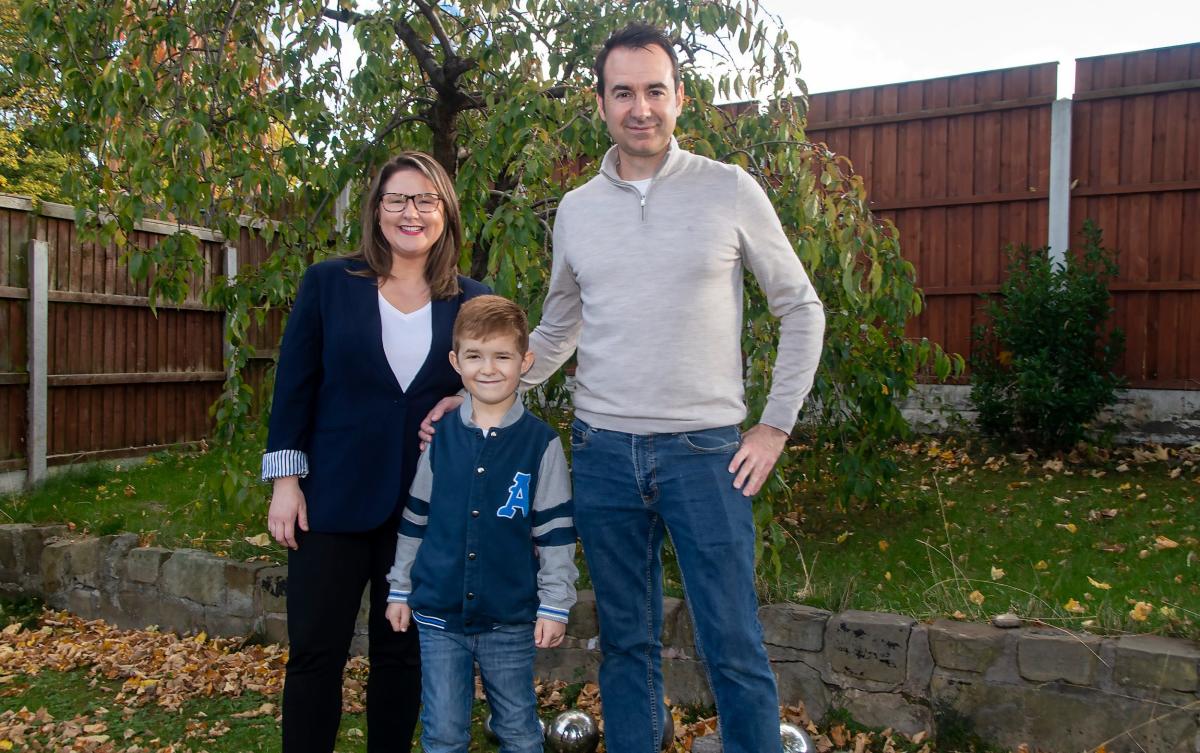A family in Canada is sharing their story of how their son, who was born with a genetic condition, was able to make a remarkable recovery due to groundbreaking medical treatments. Their son was born with a rare genetic condition called SLC6A1, which is caused by a mutation in the SLC6A1 gene. He had multiple physical and developmental delays, including the inability to walk or talk, and was facing a difficult future. However, with the help of a new gene therapy, the family was able to reverse the effects of the condition and restore their son’s physical and cognitive abilities. The family is now sharing their story to raise awareness and funds for the research and treatments that saved their son’s life.
Sarah and Rob Everitt with their son Owen who has a rare genetic condition that affects his growth and development
Shortly after Owen’s first birthday, his parents, Sarah and Rob Everitt, began to worry that there might be a problem.
“He hadn’t started to crawl or talk or even babble like a lot of babies usually do between 9 and 12 months and he wasn’t sitting up, so I started to get worried,” says Sarah.
Although they saw several pediatricians, none could diagnose a specific condition, and they began to feel that their worries were being pushed aside.
“We spent many hours in hospital waiting rooms and were referred from one department to another, but all the tests, some of which were quite invasive, came back negative every time,” says Sarah.
Years later, the family, who live in Ackworth, West Yorkshire, took part in Genomic England’s 100,000 Genomes Project, a national initiative to sequence and study the role our genes play in health and disease. And only then did they get answers. Owen, now nine years old, has been diagnosed with a rare genetic condition affecting his growth and development called THRA-related congenital hypothyroidism, which occurs when the thyroid gland is not working properly.
Owen became only the sixth person in the UK and 30th in the world to be diagnosed with the genetic disorder. It is not inherited but is due to a spontaneous mutation in a person’s DNA. Congenital hypothyroidism is usually treated by replacing the thyroxine – a hormone the body can’t produce – in pill form called levothyroxine. Many children require lifelong treatment.
The Everitt’s participated in Genomic England’s 100,000 Genomes Project, a national initiative to sequence and study the role of our genes in health and disease – SCIEPRO
As a result, he now takes medication daily: “In his early years he had no energy to walk or talk and would fall asleep in the middle of the day, but now he’s full of energy and I can’t keep up with him,” says Sarah.
Now a new research study, Newborns Genome Programme, starting later this year, will sequence the genomes of 100,000 babies over two years and collect evidence to assess whether it could be rolled out across the country. Doctors say if these diseases are caught earlier, children can be offered existing treatments much earlier, improving their long-term health prospects.
The project, which is funded by the Department for Health and Social Care with £105million, is the first time that genome sequencing will be offered to parents with healthy babies in the NHS, initially in 25 NHS hospitals.
Genomics England, a company set up by the Department for Health and Social Care, believes it is the largest study of its kind in the world and, if successful, could lead to more routine genetic testing being offered in the future. Studies show that there are at least 7,000 single gene disorders, most of which develop in early childhood.
Several thousand children born in the UK each year are affected by rare genetic diseases, but many families face years of testing and uncertainty before receiving a diagnosis, as symptoms often develop slowly and the disease persists until the diagnosis is confirmed can already be advanced substantially.
Several thousand children born in the UK each year are affected by rare genetic diseases – Petri Oeschger
dr Richard Scott, chief medical officer at Genomics England and consultant in clinical genetics at Great Ormond Street Hospital for Children, says around 3,000 children with genetic disorders are born in the UK each year who could benefit from the study. “That’s what we want Look for conditions that are ‘implementable’, that is, [in children] that can be done with existing treatments, so it’s like putting a spotlight on a specific spectrum of conditions that we can now intervene in,” says Dr. Scott.
“Currently the heel prick test [given to all newborns] only tests for nine rare diseases, so this will greatly expand the range of diseases we can look for. We have an ongoing dialogue with the public about which diseases we should include in screening, and there is still a complex set of issues that need to be addressed. Although our public consultation shows strong support for the use of newborn screening, technology is advancing very quickly and we need to ensure that parents participating in the project are aware of all the implications.
“We also need to look at the staffing requirements to provide this service to parents of newborns, in terms of the NHS providing expertise and support.”
However, some genetic specialists are more cautious about the ethical choices parents need to make. Frances Flinter, professor emeritus of clinical genetics at Guy’s and St Thomas’s Hospital in London and a member of the Nuffield Bioethics Council, which oversees the field, says it’s “a step into the unknown” and allows parents to worry unnecessarily about exams.
Some experts remain wary of the tests, saying they’re a ‘step into the unknown’ – Science Photo Library RF
“Studies have found some surprising findings where apparently healthy adults can exhibit genetic changes [mutations] which we would expect to cause serious illness and yet remain healthy. We don’t understand why this is, but by implication not all babies with obviously harmful genetic changes will develop a genetic disease.
“The goal of early, and in some cases pre-symptomatic, diagnosis of a broader spectrum of conditions will undoubtedly benefit some children and even save lives. But it is important that parents who agree to their newborn being included in this research also understand the risks,” says Professor Flinter.
“It will be crucial to ensure parents can make informed decisions about whether their baby should have these types of tests and what happens to the genomic data collected. Pharmaceutical companies will certainly be interested in acquiring it.”
Professor Flinter points out that many NHS staff, such as midwives, would need to be trained in genetic counseling to support parents who choose to have newborn screening and that this could increase the demands on the NHS as parents where Children’s services are already under pressure. Seek treatment for a child who is asymptomatic and may never develop a specific disease.
However, for Owen and his family, the screening proved life-changing. He is now doing well in school and developing normally. As the frontiers of genomic medicine continue to rapidly expand, Sarah says, “It feels like we’ve won the lottery and I would definitely recommend other parents to take advantage of the screening service if they are offered one.” to take advantage of genetic variations that could become a problem later in life.”
Don’t miss interesting posts on Famousbio









